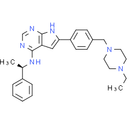Description
AEE-788 is an orally bioavailable multiple-receptor tyrosine kinase inhibitor. AEE788 inhibits phosphorylation of the tyrosine kinases of epidermal growth factor receptor (EGFR), human epidermal growth factor receptor 2 (HER2), and vascular endothelial growth factor receptor 2 (VEGF2), resulting in receptor inhibition, the inhibition of cellular proliferation, and induction of tumor cell and tumor-associated endothelial cell apoptosis. Check for active clinical trials or closed clinical trials using this agent. (NCI Thesaurus).
Product information
CAS Number: 497839-62-0
Molecular Weight: 440.58
Formula: C27H32N6
Synonym:
AEE 788
AEE-788
Chemical Name: (R)-6-(4-((4-ethylpiperazin-1-yl)methyl)phenyl)-N-(1-phenylethyl)-7H-pyrrolo[2, 3-d]pyrimidin-4-amine.
Smiles: CCN1CCN(CC2C=CC(=CC=2)C2=CC3C(N2)=NC=NC=3N[C@H](C)C2C=CC=CC=2)CC1
InChiKey: OONFNUWBHFSNBT-HXUWFJFHSA-N
InChi: InChI=1S/C27H32N6/c1-3-32-13-15-33(16-14-32)18-21-9-11-23(12-10-21)25-17-24-26(28-19-29-27(24)31-25)30-20(2)22-7-5-4-6-8-22/h4-12,17,19-20H,3,13-16,18H2,1-2H3,(H2,28,29,30,31)/t20-/m1/s1
Technical Data
Appearance: Solid Power
Purity: ≥98% (or refer to the Certificate of Analysis)
Solubility: DMSO: 88 mg/mL(199.73 mM). Water: Insoluble.
Shipping Condition: Shipped under ambient temperature as non-hazardous chemical or refer to Certificate of Analysis
Storage Condition: Dry, dark and -20 oC for 1 year or refer to the Certificate of Analysis.
Shelf Life: ≥12 months if stored properly.
Stock Solution Storage: 0 - 4 oC for 1 month or refer to the Certificate of Analysis.
Drug Formulation: To be determined
HS Tariff Code: 382200
How to use
In Vitro:
AEE788 also inhibits KDR, c-abl, c-Src, and Flt-1 with IC50 of 50-80 nM. AEE788 is not sensitive to ErbB-4, PDGFR-β, Flt-3, Flt-4, RET, and c-Kit and has no inhibitory to Ins-R, IGF-1R, PKC-α, and PKA. AEE788 potently inhibits EGFR phosphorylation in A431 cells with IC50 of 11 nM. AEE788 also inhibits the phosphorylation of KDR in CHO cells and erbB2 in BT-474 cells, without any effects on PDGF-induced phosphorylation in A31 cells. AEE788 inhibits the proliferation of NCI-H596, MK, BT-474 and SK-BR-3 cells with IC50 of 78, 56, 49 and 381 nM, respectively. Otherwise, AEE788 has the additional property of inhibiting cellular proliferation driven by EGFR mutant including 32D/EGFR and 32D/EGFRvIII. AEE788 furtheralso inhibits both EGF- and VEGF-driven HUVEC proliferation with IC50 of 43 and 155 nM, respectively. AEE788 inhibits the phosphorylation of EGFR, VEGFR2, Akt, and MAPK in human cutaneous SCC cell lines (Colo16, HaCaT, SRB1, and SRB12 cells), which leads to growth inhibition and induction of apoptosis. AEE788 inhibits the phosphorylation of EGFR and Akt in HT29 cells at 0.2 to 1.0 μM. AEE788 inhibits cell proliferation and prevents EGF- and neuregulin-induced HER1, HER2, and HER3 activation in medulloblastoma cell lines. AEE788 shows growth-suppressive activities in chemosensitive and chemoresistant medulloblastoma cells.
In Vivo:
AEE788 produces a dose-dependent inhibition of tumor growth in NCI-H596 or DU145 xenograft models, with only minor body weight changes. AEE788 induces tumor regression by 57% at 50 mg/kg in the NeuT/erbB2 GeMag model. AEE788 potently inhibits EGF-induced EGFR phosphorylation in A431 tumors and erbB2 phosphorylation in GeMag tumors. AEE788 dose-dependently inhibited angiogenesis induced by VEGF and does not inhibit bFGF-induced angiogenesis. AEE788 suppresses the growth of tumor volume by 54% in Colo16 xenografts at 50 mg/kg, which dues to the inhibition of phosphorylation of EGFR, VEGFR, Akt, and MAPK. AEE788 (50 mg/kg) also inhibits growth of tumors in the cecum and peritoneum (>50%) and reduces the incidence of lymph node metastasis to 70% in HT29 cells implanted in the cecum of nude mice, without loss of body weight and gross evidence of neovascularization. AEE788 significantly lowers the expression levels of pEGFR and pVEGFR in HT29 cecal tumors and does not alter those of EGF, VEGF, EGFR, or VEGFR. Combined with CPT-11, AEE788 has significantly smaller tumors and complete inhibition of lymph node metastasis. AEE788 inhibits the growth of Daoy, DaoyPt, and DaoyHER2 xenografts by 51%, 45%, and 72%, respectively. AEE788 could promote LBH589-mediated generation of reactive oxygen species in K562 tumor cells, which in turn increase apoptosis.
References:
- Traxler P, et al. Cancer Res, 2004, 64(14), 4931-4941.
- Park YW, et al. Clin Cancer Res, 2005, 11(5), 1963-1973.
- Yokoi K, et al. Cancer Res, 2005, 65(9), 3716-3725.
- Meco D, et al. Transl Oncol, 2010, 3(5), 326-335.
- Yu C, et al. Clin Cancer Res, 2007, 13(4), 1140-1148.
Products are for research use only. Not for human use.
Payment & Security
Your payment information is processed securely. We do not store credit card details nor have access to your credit card information.


